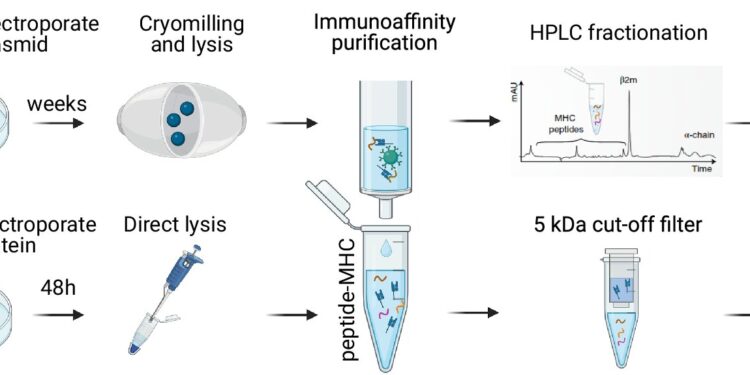Workflow for generating SARS-CoV-2-derived HLA I and HLA II immunopeptidome data. Credit: Natural communications (2024). DOI: 10.1038/s41467-024-51959-6
Melbourne researchers have discovered more than 200 new vaccine candidates for the COVID-19 virus, SARS-CoV-2, which could lead to the development of vaccines with longer and broader immunity than existing vaccinations.
In an article published in the journal Natural communicationsResearch led by Professor Anthony W. Purcell and first authored by Dr Asolina Braun of the Monash Biomedicine Discovery Institute, studies seven proteins from the COVID-19 virus that could become targets for new vaccines.
The first vaccines designed to fight COVID-19 targeted the Spike protein from the original Wuhan strain. However, while this approach has produced several highly effective and safe vaccines in a surprisingly short period of time, it also has some limitations, according to Dr. Braun. “The SARS-CoV-2 virus has mutated its Spike protein, causing current vaccines to be less effective,” she said.
“In addition, the original vaccines focused on B cell-mediated antibody responses to build immunity. We now know that recruiting the other arm of the immune system, T cells, can help maintain immunity longer.”
In the study, researchers describe more than 200 SARS-CoV-2-derived peptides that could be targets for new and improved COVID-19 vaccines and validate that a number of these peptides can trigger human responses. T lymphocytes in convalescent people.
Reflecting on this achievement, lead researcher Professor Tony Purcell notes: “As part of a long-term collaboration with Evaxion Biotech, we pivoted and turned our attention to SARS-CoV-2 during the pandemic. Rather than continuing the dominant attention that has focused primarily on the Spike glycoprotein, we have turned our attention to other, more conserved viral proteins as potential targets for next-generation vaccines.
“The combination of the Monash team’s epitope discovery through immunopeptidomics and protein chemistry, T cell immunology at the Peter Doherty Institute and Evaxion’s AI-guided bioinformatics expertise has been essential to the development of this article which highlights the potential of several conserved viral proteins as vaccine candidates. “.
According to Dr. Braun, COVID-19 continues to place a heavy burden on health systems around the world, and “this continued burden is primarily due to the spread of several new variants. to target multiple viral strains and confer widespread protection across the global population,” she said.
“The next generation of vaccines will benefit from achieving B-cell and T-cell mediated immunity against several COVID proteins. Our study discovered promising candidates for the development of such vaccines.”
More information:
Asolina Braun et al, Immunopeptidome mapping of seven SARS-CoV-2 antigens across common HLA haplotypes, Natural communications (2024). DOI: 10.1038/s41467-024-51959-6
Provided by Monash University
Quote: Newly Discovered COVID Vaccine Targets May Last Longer (October 9, 2024) retrieved October 9, 2024 from
This document is subject to copyright. Except for fair use for private study or research purposes, no part may be reproduced without written permission. The content is provided for informational purposes only.



